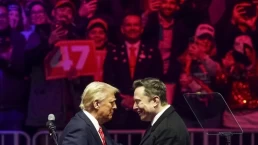Two billionaires, Donald Trump and Elon Musk, are squabbling over the federal government’s spoils. It seems almost quaint to worry about a revolving door between the public and private sectors now that the whole facade’s been blown off.
By Meagan Day, Jacobin
Karl Marx and Friedrich Engels famously observed that the “executive of the modern state is but a committee for managing the common affairs of the whole bourgeoisie.” In describing the “exclusive political sway” that the ruling class has over political representatives in capitalist democracies, they may have overestimated the need for an impartial-seeming middleman. Turns out billionaires are free to shamelessly pervert democracy for personal gain, no concealment necessary.
This week, as Donald Trump and Elon Musk’s alliance breaks down in a flurry of taunts and ripostes on the social media platforms owned by each, we’re witnessing something vastly cruder than corporate capture of democratic institutions. We now have two self-interested billionaires openly playing tug of war with the federal government while 330 million Americans’ economic needs go unaddressed.
Donald Trump seems to be primarily motivated by power and attention, not money per se. Nevertheless, Trump has found several ways to use his presidential power to further enrich himself. Replenishing his coffers has enabled him to fight expensive legal battles and fund a reascent to the White House. Still, his personal fortune wasn’t quite enough to pull off a successful third presidential campaign. To make up for financial shortfalls, Trump turned to fellow billionaires, especially in tech — and above all Elon Musk, the world’s richest man, who contributed nearly $300 million to Trump’s reelection effort.

In return, Musk pursued a turbocharged version of the same self-enrichment strategy, using his influence in the Trump administration to protect and expand federal contracts, subsidies, loans, and tax credits that contribute to his financial empire. Musk’s companies have benefited from public subsidies and privatizing public services for many years. The strategy over the last year has been to cement their importance, making Musk’s personal corporate empire integral to basic government operations in ways that would have been unimaginable just a decade ago.
SpaceX now holds a monopoly on American crewed spaceflight, making it the sole provider for International Space Station missions. Tesla dominated the electric vehicle market through federal incentives while positioning itself at the center of national charging infrastructure. Tesla also made $2.8 billion last year selling regulatory credits to other automakers to help them meet emissions standards. Starlink secured Pentagon and intelligence contracts for national security communications and was set to take over a multibillion-dollar contract to upgrade the Federal Aviation Administration’s air traffic control systems.
While defense contractors and tech giants have long enjoyed cozy relationships with Washington, none have achieved Musk’s unique position: simultaneous control over space transportation, defense communications, and energy infrastructure, combined with direct policy influence. While this level of government dependence on a single private actor is not exactly a novel dynamic in American capitalism, it hasn’t been glimpsed so fully since the Gilded Age.
Recent Posts
Gavin Newsom’s last budget belies his ‘California for All’ pledge
February 24, 2026
Take Action Now Yet, even as the state is poised to lose billions in federal funding, and millions of Californians are losing access to health care…
Israel and American Hawks are Pushing U.S. to Iran War With Catastrophic Consequences
February 23, 2026
Take Action Now At the World Health Assembly in May, member states may endorse an unprecedented strategy declaring that health is not a cost – but…
A Child’s View of the Attack on Venezuela. And a Peace Flotilla
February 23, 2026
Take Action Now At the World Health Assembly in May, member states may endorse an unprecedented strategy declaring that health is not a cost – but…
How to Organize Safely in the Age of Surveillance
February 22, 2026
Take Action Now From threat modeling to encrypted collaboration apps, we’ve collected experts’ tips and tools for safely and effectively building a…




